Mathieu orfila Study guides, Class notes & Summaries
Looking for the best study guides, study notes and summaries about Mathieu orfila? On this page you'll find 35 study documents about Mathieu orfila.
Page 4 out of 35 results
Sort by
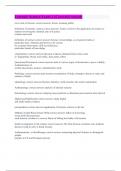
-
Forensic Science Exam 1 (Correctly solved)
- Exam (elaborations) • 7 pages • 2024
-
Available in package deal
-
- $11.19
- + learn more
root word of forensic correct answers forum, meaning public definition of forensic science correct answers Today it refers to the application of science to matters involving the criminal and civil justice systems and court definition of science correct answers Science is knowledge, as of general truths or particular facts, obtained and shown to be correct by accurate observation; skill or proficiency; particular branch of knowledge criminalistics correct answers physical evide...
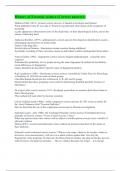
-
History of Forensic science (Correct answers)
- Exam (elaborations) • 2 pages • 2024
-
Available in package deal
-
- $10.69
- + learn more
Mathieu Orfila (1814) - poisons correct answers A Spanish toxicologist and chemist Work published when he was only 27 based on experimental observation on the symptoms of poisoning e.g the appearances that poisons leave in the dead body, on their physiological action, and on the means of detecting them Alphonse Bertillon (1879) - anthropometry correct answers Developed an identification system - unchanging characteristics of human body Father of the Mug Shot Several physical features / di...
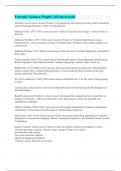
-
Forensic Science People (All answered)
- Exam (elaborations) • 3 pages • 2024
-
Available in package deal
-
- $10.79
- + learn more
Edmond Locard correct answers France 1910 opened the first crime lab in the world. Coined the Lacard Exchange Principle. Father of Criminalistics Mathieu Orfila () correct answers "Father of Forensics toxicology" Tested arsenic in the body Alphonse Bertillon () correct answers "Father of Criminal Identification-using anthropometry—body measures of means of identification--problem is that people change-very cumbersome Johannes Purkinje () correct answers Was the first to classify fi...
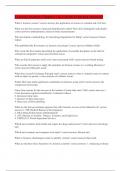
-
Forensic Science Chapter 1 & 2 (with Errorless answers)
- Exam (elaborations) • 3 pages • 2024
-
Available in package deal
-
- $10.79
- + learn more
What is forensic science? correct answers the application of science to criminal and civil laws What was the first system of personal identification called? How did it distinguish individuals? correct answers anthropometry; based on body measurements Who developed a methodology for classifying fingerprints for filing? correct answers Francis Galton Who published the first treatise on forensic toxicology? correct answers Mathieu Orfila Who wrote the first treatise describing the appli...
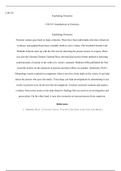
-
CJS215 INTRODUCTION TO FORENSICS .doc CJS/215 Explaining Forensics CJS/215: Introduction to Forensics Explaining Forensics Forensic science goes back to many centuries. There have been individuals who have observed evidence, and applied those basic
- Summary • 1 pages • 2021
-
- $7.49
- + learn more
CJS215 INTRODUCTION TO FORENSICS .doc CJS/215 Explaining Forensics CJS/215: Introduction to Forensics Explaining Forensics Forensic science goes back to many centuries. There have been individuals who have observed evidence, and applied those basic scientific skills to solve crimes. The Swedish Chemist Carl Wilhelm Scheele came up with the first test for detecting the poison arsenic in corpses. There was also the German Chemist Valentin Ross who had discovered a better method to detecting...

Do you wonder why so many students wear nice clothes, have money to spare and enjoy tons of free time? Well, they sell on Stuvia! Imagine your study notes being downloaded a dozen times for $15 each. Every. Single. Day. Discover all about earning on Stuvia


